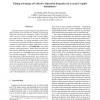Free Online Productivity Tools
i2Speak
i2Symbol
i2OCR
iTex2Img
iWeb2Print
iWeb2Shot
i2Type
iPdf2Split
iPdf2Merge
i2Bopomofo
i2Arabic
i2Style
i2Image
i2PDF
iLatex2Rtf
Sci2ools
82
Voted
IPPS
2007
IEEE
2007
IEEE
Taking Advantage of Collective Operation Semantics for Loosely Coupled Simulations
Although a loosely coupled component-based framework offers flexibility and versatility for building and deploying large-scale multi-physics simulation systems, the performance of such a system can suffer from excessive buffering of data objects which may or may not be transferred between components. By taking advantages of the collective properties of parallel simulation components, which is common for data-parallel scientific applications, an optimization method, which we call buddy-help, can greatly enhance overall performance. Buddy-Help can reduce the time taken for buffering operations in an exporting component, when there are timing differences across processes in the exporting component. The optimization enables skipping unnecessary buffering operations, once another process, which has already performed the collective export operation, has determined that the buffered data will never be needed. Because an analytical study would be very difficult due to the complexity of the...
Buffering Operations | Distributed And Parallel Computing | IPPS 2007 | Large-scale Multi-physics Simulation | Simulation System |
| Added | 03 Jun 2010 |
| Updated | 03 Jun 2010 |
| Type | Conference |
| Year | 2007 |
| Where | IPPS |
| Authors | Joe Shang-Chieh Wu, Alan Sussman |
Comments (0)

